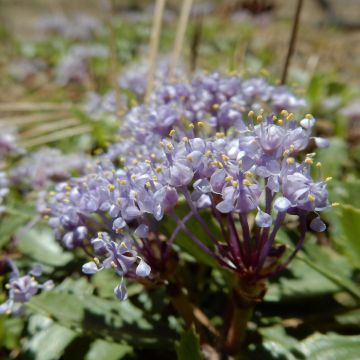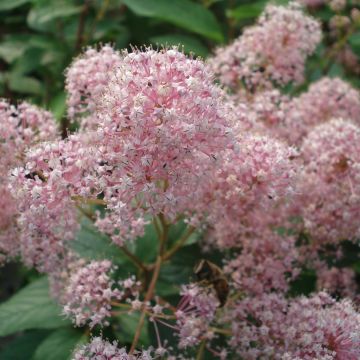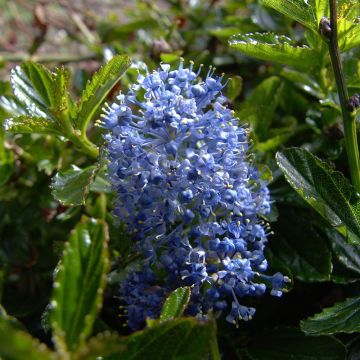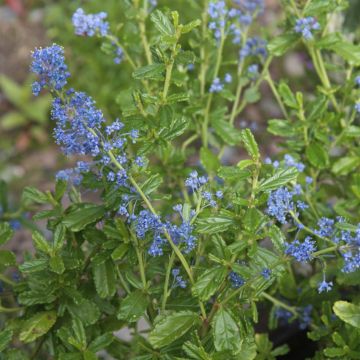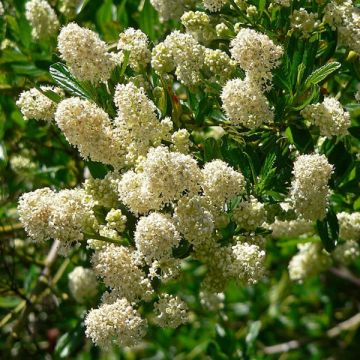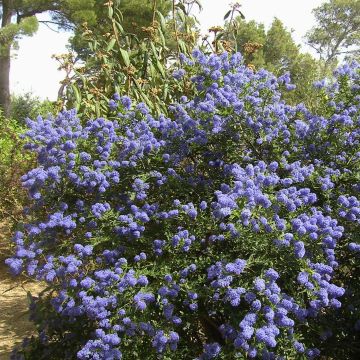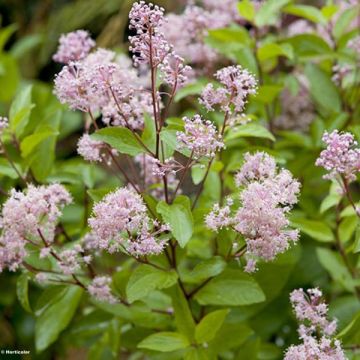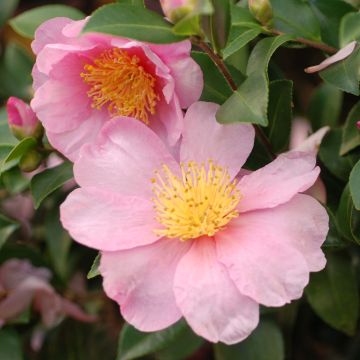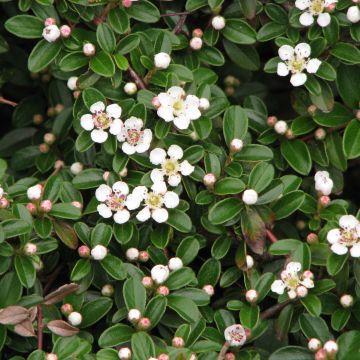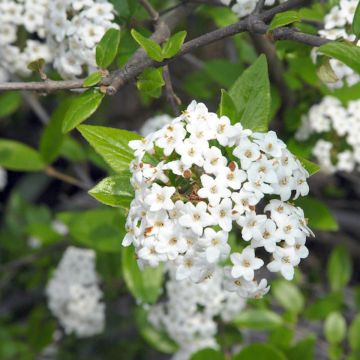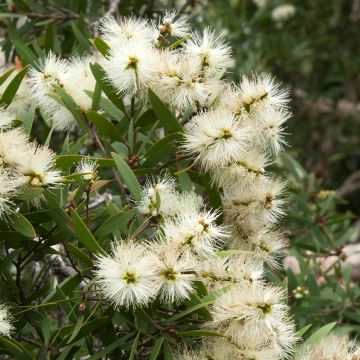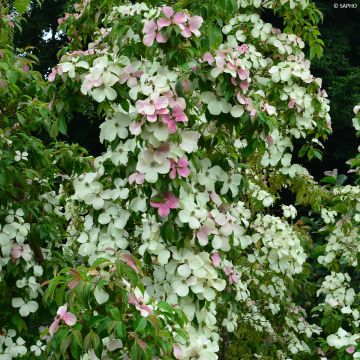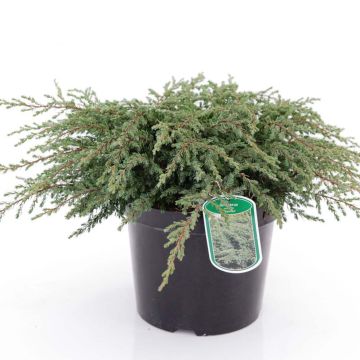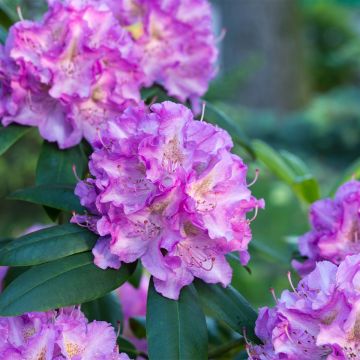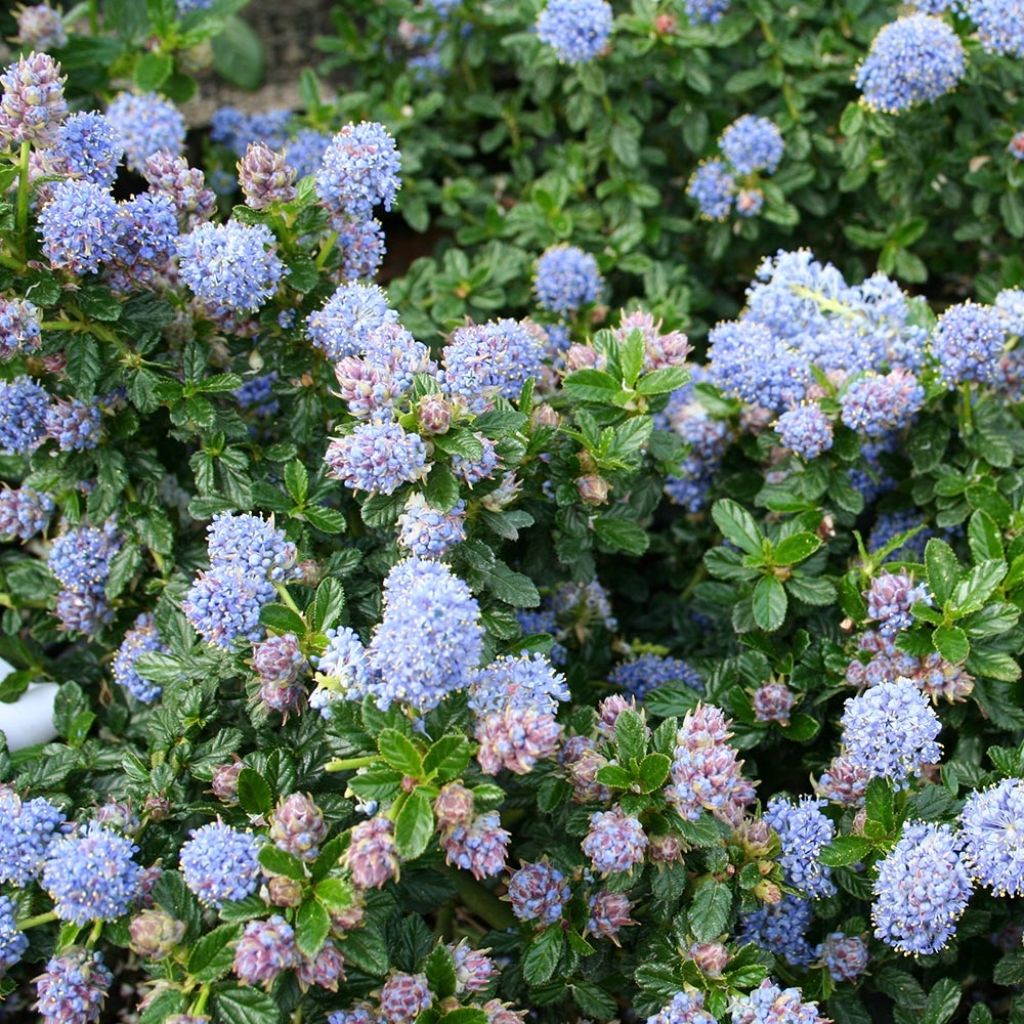

Ceanothus Blue Mound
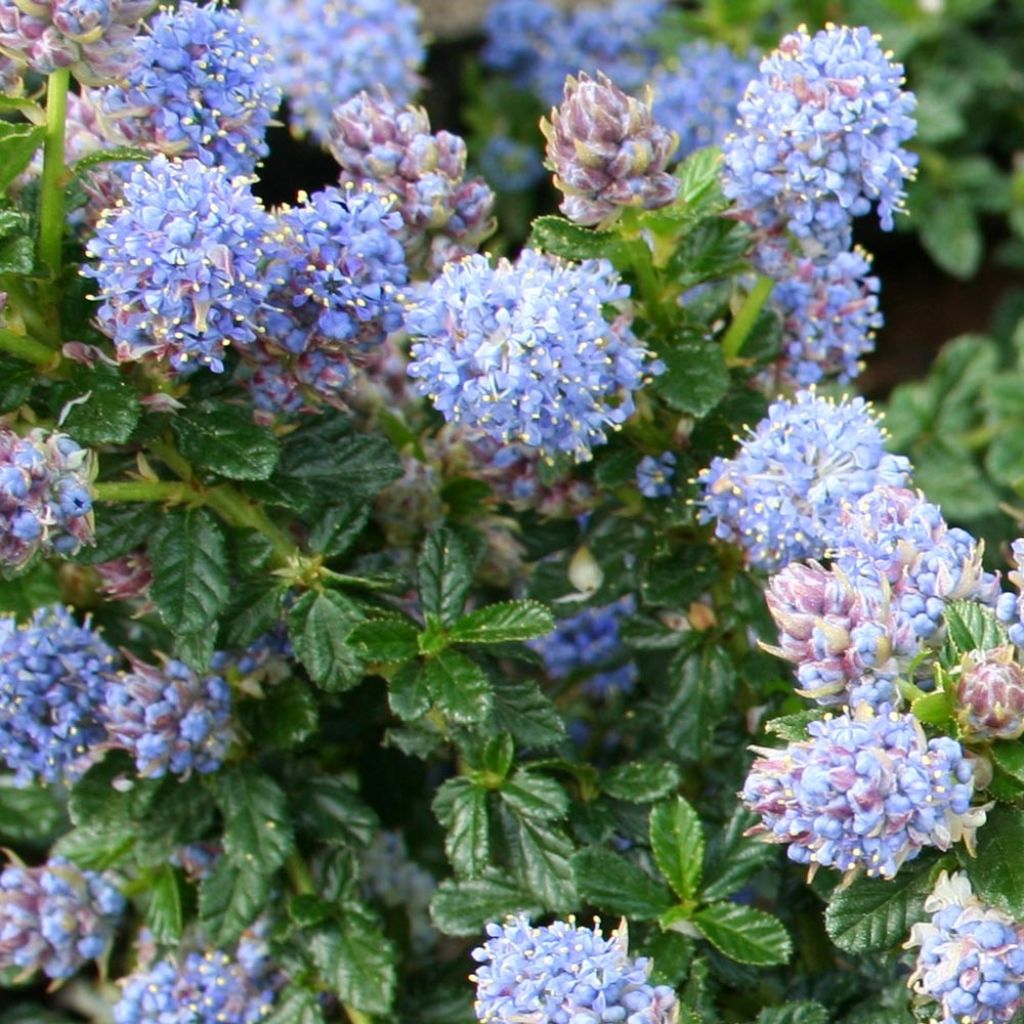

Ceanothus Blue Mound
Ceanothus Blue Mound
Ceanothus Blue Mound
California Lilac
This item cannot be shipped to the selected country
Delivery charge from €5.90
Delivery charge from €5.90
More information
Schedule delivery date,
and select date in basket
This plant carries a 24 months recovery warranty
More information
We guarantee the quality of our plants for a full growing cycle, and will replace at our expense any plant that fails to recover under normal climatic and planting conditions.
From €5.90 for pickup delivery and €6.90 for home delivery
Express home delivery from €8.90.
From €5.90 for pickup delivery and €6.90 for home delivery
Express home delivery from €8.90.

Does this plant fit my garden?
Set up your Plantfit profile →
Description
Ceanothus 'Blue Mound' is an evergreen variety forming a rounded and spreading, very dense clump, reaching about 1.5 m (4.9 ft) in height and 2 m (6.6 ft) in spread at maturity. Its intense green foliage, composed of small shiny oval leaves, serves as a backdrop in May-June for a superb, very bright sky-blue flowering. Not demanding on soil type, fast growing, not fearing the sun or drought, it ages better in poor and light soils, and prefers regions with mild winters.
Evergreen ceanothus are native to California. They belong to the Rhamnaceae family and are cousins of buckthorn (Frangula alnus).
'Blue Mound' was selected by Hillier Nurseries in England. This excellent variety holds the prestigious RHS Award of Garden Merit. It has a naturally bushy, compact and spreading habit; it is a bushy shrub that can reach 1.5 m (4.9 ft) in height and 2 m (6.6 ft) in spread in a few years. In May and June, an abundance of flowers appears at the end of the branches in the form of small dense panicles of bright sky-blue flowers. This fragrant flowering attracts many pollinating insects. It is followed by the formation of seeds which, once mature, are explosively released. The evergreen foliage is composed of small alternate, elongated and finely toothed leaves, of a shiny dark green, 1 cm to 3 cm (0.4 in to 1.2 in) long. This variety tolerates light pruning after flowering. Its average lifespan is 15 to 20 years, and its preferred climate will be rather maritime.
In recent years, horticulturists have 'invented' new varieties of ceanothus that are smaller and easier to acclimatise, making them perfect for our gardens and terraces. With good hardiness that goes down to -10°C to -12°C (14° F to 10.4° F) in well-drained soil, tolerating slightly limestone soils if they are light, 'Blue Mound' is an adorable small evergreen that is easy to integrate into the garden or rockery. Planted on the edge of a larger shrub bed, it adds the final touch that is appreciated in a well-kept garden. It can be planted with cistus, which is also evergreen and flowering in spring. Their pink or white corollas will harmonise perfectly with the bright blue clusters of 'Blue Mound'. This medium-sized variety will also enhance your balconies and terraces, with a few precautions.
Report an error about the product description
Ceanothus Blue Mound in pictures
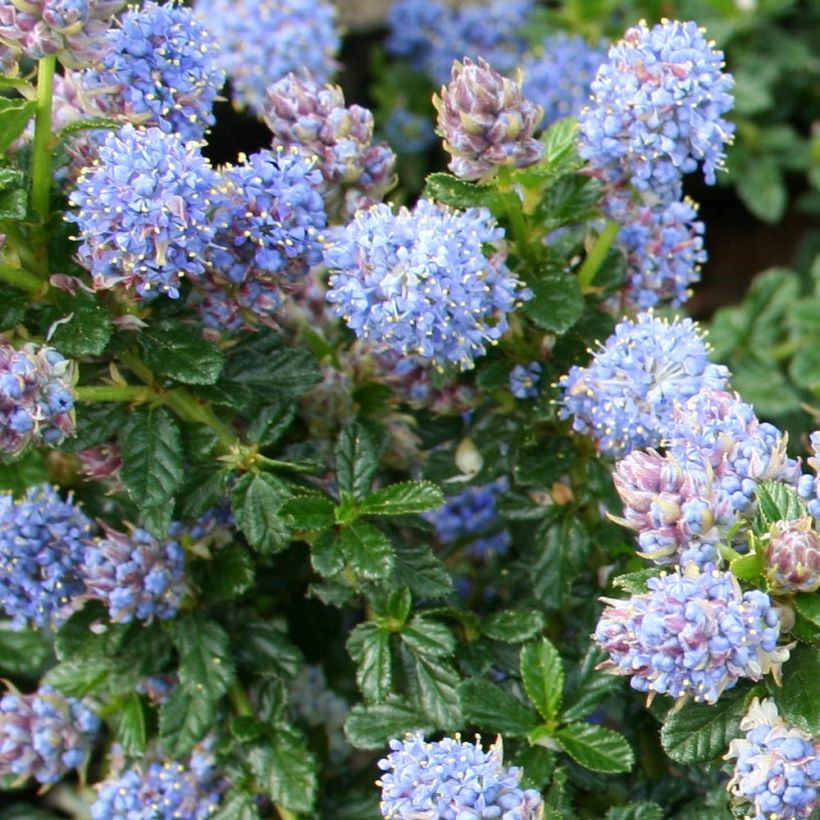

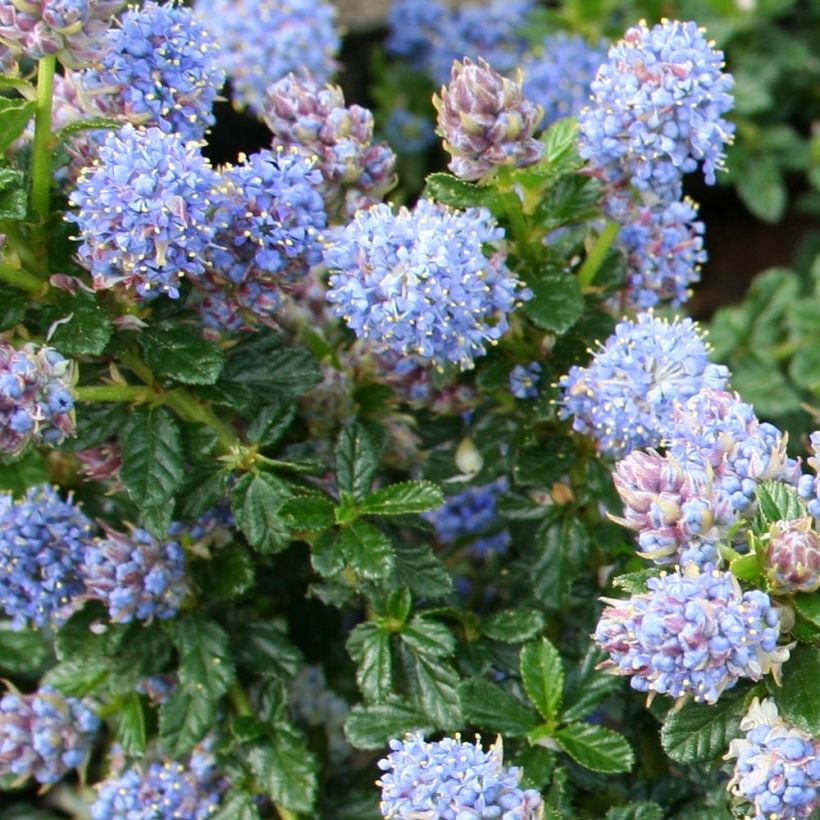

Plant habit
Flowering
Foliage
Botanical data
Ceanothus
Blue Mound
Rhamnaceae
California Lilac
Cultivar or hybrid
Other Ceanothus
Planting and care
Place in a sunny or partially shaded location. Plant it in ordinary soil that should be moist but definitely well-drained in summer. Be careful of cold drafts that the bush does not like. It can be placed near a wall. Plant it throughout the year, except during frost, by mixing your garden soil with compost, coarse sand, perlite or any material that does not retain moisture. Water generously once or twice a week to promote establishment. Only water twice a month from the third year onwards, and only in case of drought. It is a plant that requires very little maintenance and grows easily as long as the conditions are met. Moisture in the soil during the winter period, as well as the summer period, is harmful to the plant. The combination of high heat and humidity leads to the development of a fungus that attacks the plant's collar and will be fatal to it. That is why, in affected soils, it is better to plant Ceanothus on a mound. You can lightly prune the stems after flowering to encourage the plant to branch out. Fertiliser applications are not recommended (just add a little horn at the bottom of the planting hole). Avoid severe pruning.
Pot cultivation:
Use a light substrate, a mixture of garden soil, coarse sand, and compost. In summer, water only when the soil is dry, abundantly but spaced out. The plant can be stored in a cool, bright room with little or no heating, protected from severe frost. Apply a slow-release fertiliser in spring and autumn.
Planting period
Intended location
Care
-
, onOrder confirmed
Reply from on Promesse de fleurs
Evergreen shrubs
Haven't found what you were looking for?
Hardiness is the lowest winter temperature a plant can endure without suffering serious damage or even dying. However, hardiness is affected by location (a sheltered area, such as a patio), protection (winter cover) and soil type (hardiness is improved by well-drained soil).

Photo Sharing Terms & Conditions
In order to encourage gardeners to interact and share their experiences, Promesse de fleurs offers various media enabling content to be uploaded onto its Site - in particular via the ‘Photo sharing’ module.
The User agrees to refrain from:
- Posting any content that is illegal, prejudicial, insulting, racist, inciteful to hatred, revisionist, contrary to public decency, that infringes on privacy or on the privacy rights of third parties, in particular the publicity rights of persons and goods, intellectual property rights, or the right to privacy.
- Submitting content on behalf of a third party;
- Impersonate the identity of a third party and/or publish any personal information about a third party;
In general, the User undertakes to refrain from any unethical behaviour.
All Content (in particular text, comments, files, images, photos, videos, creative works, etc.), which may be subject to property or intellectual property rights, image or other private rights, shall remain the property of the User, subject to the limited rights granted by the terms of the licence granted by Promesse de fleurs as stated below. Users are at liberty to publish or not to publish such Content on the Site, notably via the ‘Photo Sharing’ facility, and accept that this Content shall be made public and freely accessible, notably on the Internet.
Users further acknowledge, undertake to have ,and guarantee that they hold all necessary rights and permissions to publish such material on the Site, in particular with regard to the legislation in force pertaining to any privacy, property, intellectual property, image, or contractual rights, or rights of any other nature. By publishing such Content on the Site, Users acknowledge accepting full liability as publishers of the Content within the meaning of the law, and grant Promesse de fleurs, free of charge, an inclusive, worldwide licence for the said Content for the entire duration of its publication, including all reproduction, representation, up/downloading, displaying, performing, transmission, and storage rights.
Users also grant permission for their name to be linked to the Content and accept that this link may not always be made available.
By engaging in posting material, Users consent to their Content becoming automatically accessible on the Internet, in particular on other sites and/or blogs and/or web pages of the Promesse de fleurs site, including in particular social pages and the Promesse de fleurs catalogue.
Users may secure the removal of entrusted content free of charge by issuing a simple request via our contact form.
The flowering period indicated on our website applies to countries and regions located in USDA zone 8 (France, the United Kingdom, Ireland, the Netherlands, etc.)
It will vary according to where you live:
- In zones 9 to 10 (Italy, Spain, Greece, etc.), flowering will occur about 2 to 4 weeks earlier.
- In zones 6 to 7 (Germany, Poland, Slovenia, and lower mountainous regions), flowering will be delayed by 2 to 3 weeks.
- In zone 5 (Central Europe, Scandinavia), blooming will be delayed by 3 to 5 weeks.
In temperate climates, pruning of spring-flowering shrubs (forsythia, spireas, etc.) should be done just after flowering.
Pruning of summer-flowering shrubs (Indian Lilac, Perovskia, etc.) can be done in winter or spring.
In cold regions as well as with frost-sensitive plants, avoid pruning too early when severe frosts may still occur.
The planting period indicated on our website applies to countries and regions located in USDA zone 8 (France, United Kingdom, Ireland, Netherlands).
It will vary according to where you live:
- In Mediterranean zones (Marseille, Madrid, Milan, etc.), autumn and winter are the best planting periods.
- In continental zones (Strasbourg, Munich, Vienna, etc.), delay planting by 2 to 3 weeks in spring and bring it forward by 2 to 4 weeks in autumn.
- In mountainous regions (the Alps, Pyrenees, Carpathians, etc.), it is best to plant in late spring (May-June) or late summer (August-September).
The harvesting period indicated on our website applies to countries and regions in USDA zone 8 (France, England, Ireland, the Netherlands).
In colder areas (Scandinavia, Poland, Austria...) fruit and vegetable harvests are likely to be delayed by 3-4 weeks.
In warmer areas (Italy, Spain, Greece, etc.), harvesting will probably take place earlier, depending on weather conditions.
The sowing periods indicated on our website apply to countries and regions within USDA Zone 8 (France, UK, Ireland, Netherlands).
In colder areas (Scandinavia, Poland, Austria...), delay any outdoor sowing by 3-4 weeks, or sow under glass.
In warmer climes (Italy, Spain, Greece, etc.), bring outdoor sowing forward by a few weeks.

































